Related Research Articles
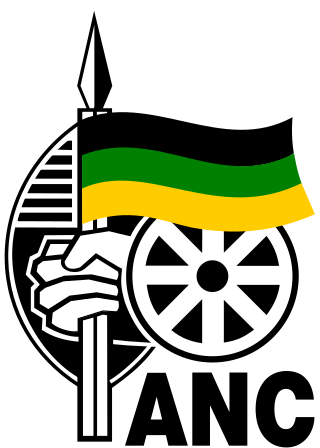
The African National Congress (ANC) is a political party in South Africa. It originated as a liberation movement known for its opposition to apartheid and has governed the country since 1994, when the first post-apartheid election resulted in Nelson Mandela being elected as President of South Africa. Cyril Ramaphosa, the incumbent national President, has served as President of the ANC since 18 December 2017.
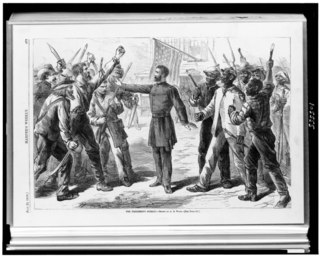
The Bureau of Refugees, Freedmen, and Abandoned Lands, usually referred to as simply the Freedmen's Bureau, was a U.S. government agency of early post American Civil War Reconstruction, assisting freedmen in the South. It was established on March 3, 1865, and operated briefly as a federal agency after the War, from 1865 to November 1872, to direct provisions, clothing, and fuel for the immediate and temporary shelter and supply of destitute and suffering refugees and freedmen and their wives and children.
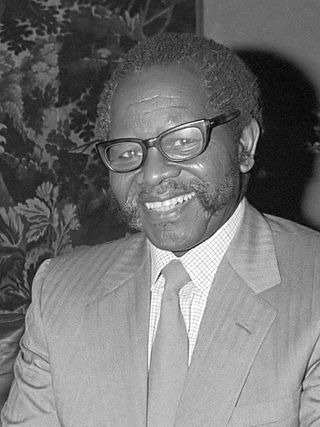
Oliver Reginald Kaizana Tambo was a South African anti-apartheid politician and activist who served as President of the African National Congress (ANC) from 1967 to 1991.
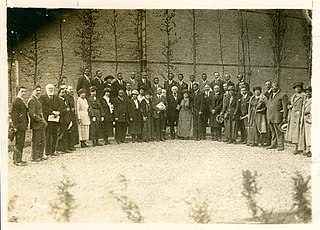
The Pan-African Congress (PAC) is a regular series of meetings which first took place on the back of the Pan-African Conference held in London in 1900.
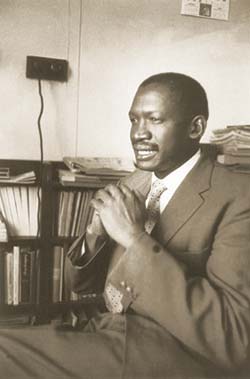
Robert Mangaliso Sobukwe OMSG was a South African anti-apartheid revolutionary and founding member of the Pan Africanist Congress (PAC), serving as the first president of the organization.

Pan-Africanism is a worldwide movement that aims to encourage and strengthen bonds of solidarity between all indigenous peoples and diasporas of African ancestry. Based on a common goal dating back to the Atlantic slave trade, the movement extends beyond continental Africans with a substantial support base among the African diaspora in the Americas and Europe.

The Black Consciousness Movement (BCM) was a grassroots anti-apartheid activist movement that emerged in South Africa in the mid-1960s out of the political vacuum created by the jailing and banning of the African National Congress and Pan Africanist Congress leadership after the Sharpeville Massacre in 1960. The BCM represented a social movement for political consciousness.
[Black Consciousness'] origins were deeply rooted in Christianity. In 1966, the Anglican Church under the incumbent, Archbishop Robert Selby Taylor, convened a meeting which later on led to the foundation of the University Christian Movement (UCM). This was to become the vehicle for Black Consciousness.

African nationalism is an umbrella term which refers to a group of political ideologies in West, Central, East and Southern Africa, which are based on the idea of national self-determination and the creation of nation states. The ideology emerged under European colonial rule during the 19th and 20th centuries and was loosely inspired by nationalist ideas from Europe. Originally, African nationalism was based on demands for self-determination and played an important role in forcing the process of decolonisation of Africa. However, the term refers to a broad range of different ideological and political movements and should not be confused with Pan-Africanism which may seek the federation of many or all nation states in Africa.
The South African Students' Organisation (SASO) was a body of black South African university students who resisted apartheid through non-violent political action. The organisation was formed in 1969 under the leadership of Steve Biko and Barney Pityana and made vital contributions to the ideology and political leadership of the Black Consciousness Movement. It was banned by the South African government in October 1977, as part of the repressive state response to the Soweto uprising.

Charlene Alexander Mitchell was an American international socialist, feminist, labor and civil rights activist. In 1968, she became the first Black woman candidate for President of the United States.
TransAfrica is an advocacy organization in Washington, D.C. that seeks to influence the foreign policy of the United States concerning African and Caribbean countries and all African diaspora groups. It is a research, education, and advocacy center for activism related to social, economic and political conditions in Africa, the Caribbean, and Latin America and other parts of the African Diaspora. TransAfrica is the largest and oldest social justice organization in the U.S that focuses on the African world. It has served as a major research, educational, and organizing institution for the African and African descendant communities and for the U.S. public in general.
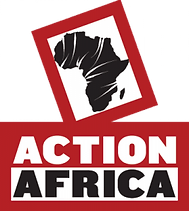
Africa Action is a nonprofit organization that is based in Washington, D.C., working to change U.S.–Africa relations to promote political, economic and social justice in nations of Africa. They provide accessible information and analysis, and mobilize popular support for campaigns to achieve this mission.

Charles E. "Charlie" Cobb Jr. is a journalist, professor, and former activist with the Student Nonviolent Coordinating Committee (SNCC). Along with several veterans of SNCC, Cobb established and operated the African-American bookstore Drum and Spear in Washington, D.C., from 1968 to 1974. Currently he is a senior analyst at allAfrica.com and a visiting professor at Brown University.
Cecil Elombe Brath was a Pan-African activist, born in New York City of Barbadian heritage, who is best known for founding the Patrice Lumumba Coalition. He was an influential activist, recognized by Stokely Carmichael as the "Dean of Harlem Nationalists" and by Dudley Thompson, an "Icon of the Pan-African Movement".
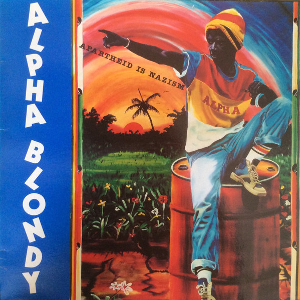
Apartheid Is Nazism is an album by the Ivorian musician Alpha Blondy. The title track was a hit; the album, as an import, was a success in the United States prior to its Shanachie release. Blondy supported the album with a North American tour.
Patricia L. Beeman was a human rights activist based in East Lansing, Michigan, who led local- and state-based efforts to fight apartheid in South Africa, and efforts in support of independence movements in Zimbabwe and Namibia. She was named to the Michigan Women's Hall of Fame in 1999 in recognition for her work in the field of civil rights.

South Africa–Sweden relations refers to the bilateral relations between Sweden and South Africa. Formal relations between the two countries began with the opening of a South African legation in the 1930s with relations being upgraded to ambassadorial level in 1994 following South Africa's first non-racial democratic elections. In 2000 a South African - Swedish Binational Commission was established by President Thabo Mbeki and Prime Minister Göran Persson.
Jean Sindab was an international antiracist activist, scholar, and lobbyist. Sindab was executive director of the Washington Office on Africa from 1980 to 1986, a group that worked on influencing U.S. foreign policy on South Africa and Namibia's apartheid. Sindab was also a consultant for the King Center for Non-Violence and two United Nations agencies: the Council for Namibia and U.N. Centre Against Apartheid. In the late 1980s she moved to Geneva, Switzerland and was executive secretary and co-director of the Programme to Combat Racism of the World Council of Churches.

Medu Art Ensemble was a multiracial, Pan-African, and anti-colonial collective of cultural activists based in Gaborone, Botswana during the height of the anti-apartheid resistance movement during the late twentieth century. The collective formed originally in 1979 and was formed to give voice to South Africa’s apartheid policy of racial segregation (1948-1994) and liberation struggles in neighboring countries Angola, Botswana, Mozambique, Namibia, and Zimbabwe. The group was formed after the 1976 Soweto Uprising, when many South African activists were forced into exile. The group was composed of over 60 musicians, performance artists, visual artists, researchers, writers, and poets. Most of the members were South African, but some were from the United States of America, Canada, Cuba, Brazil, Sweden, and Botswana. As a "non-aligned" group, Medu worked with artists from various racial, social, political, and cultural backgrounds. Medu’s members, or “cultural workers” as they preferred to be called, eventually organized and relocated to Gaborone, Botswana in 1978. They felt that the term "cultural workers" was far more fitting to their mission rather than referring to themselves as artists because the such a pursuit was regarded as something trivial and therefore inherently elitist and white. With the support of the African National Congress (ANC), in Gaborone, Medu officially registered as a cultural organization with the Botswanan government. Medu means “roots” in the Northern Sotho language Sepedi, and describes the collective's underground operations. The collective’s cultural work was divided into six units; Publications and Research, Graphic Arts and Design, Music, Theatre, Photography, and Film.

Operation Vula was a secret domestic programme of the African National Congress (ANC) during the final years of apartheid in South Africa. Initiated in 1986 at the ANC headquarters in Lusaka and launched in South Africa in 1988, its operatives infiltrated weapons and banned ANC leaders into the country, in order to establish an underground network linking domestic activist structures with the ANC in exile. It was responsible for facilitating the only direct line of communication between ANC headquarters and Nelson Mandela, who at the time was imprisoned and was discussing a negotiated settlement with the government on the ANC's behalf. The operation was disbanded in 1990, after its existence had been publicly revealed and eight of its leaders charged under the Internal Security Act with terrorism and plotting an armed insurrection.
References
- 1 2 Minter, William (September 2004). Minter, William; Hovey, Gail; Cobb Jr., Charles (eds.). "Interview with Sylvia Hill, September 23, 2003". No Easy Victories. Retrieved 2023-06-16.
- 1 2 3 Hall 2022, p. 11.
- 1 2 Minter, William. Minter, William; Hovey, Gail; Cobb Jr., Charles (eds.). "Sylvia Hill: From the Sixth Pan-African Congress to the Free South Africa Movement". No Easy Victories. Retrieved 2023-06-16.
- 1 2 "Southern Africa Support Project". African Activist Archive. Retrieved 2023-06-21.
- 1 2 Counts, Hill & Hill 1984, p. 44.
- 1 2 3 Myers 2020, p. 50.
- ↑ "Southern Africa Support Project". ArcGIS StoryMaps. 2022-10-25. Retrieved 2023-06-21.
- ↑ Hall 2022, p. 10.
- ↑ "Southern Africa Resource List" . The Black Scholar. 16 (6): 39. 1985. ISSN 0006-4246. JSTOR 41067222.
Sources
- Counts, Cecelie; Hill, Sylvia; Hill, Sandra (November 1984). "Notes On Building International Solidarity In the United States" . Crisis in Southern Africa. 15 (6): 44–52. JSTOR 41067118.
- Hall, Amanda Joyce (2022). "Black Students and the U.S. Anti-Apartheid Movements on Campus, 1976–1985". Zanj: The Journal of Critical Global South Studies. 6 (1): 8–28. doi: 10.13169/zanjglobsoutstud.6.1.0002 . JSTOR 48685028.
- Myers, Joshua M. (Fall 2020). "Organizing Howard" . Washington History. 32 (1): 49–51. JSTOR 26947519.